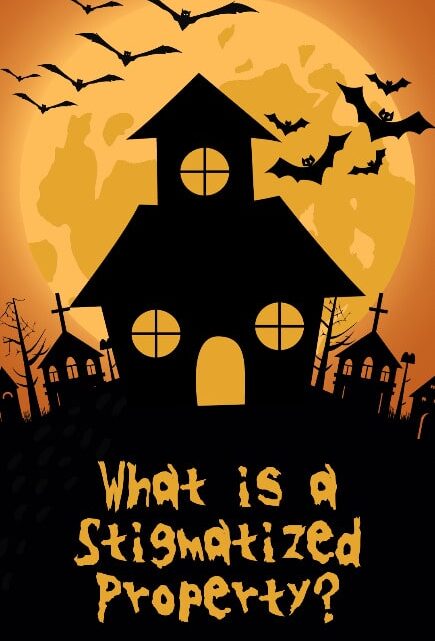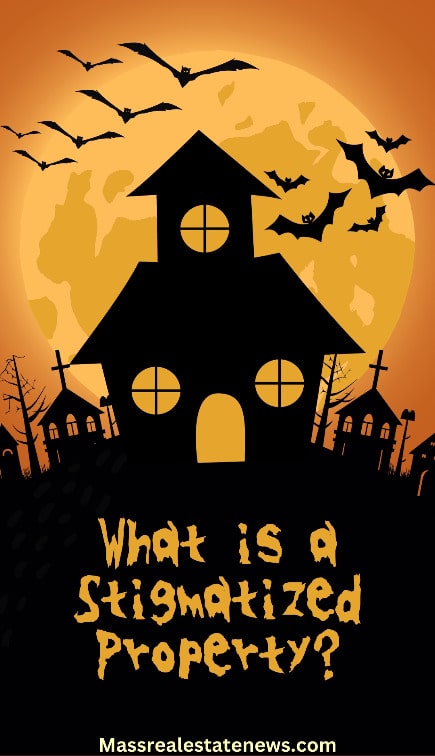Cursed, plagued, or simply discomforting, Massachusetts stigmatized properties are real estate enigmas that turn the conventional house-hunting journey on its head.
Whether it’s a gruesome history, reputed hauntings, or uncommon cultural superstitions, these properties carry invisible marks of past events that some potential buyers might find chilling.
In this deep dive, we uncover everything you need to know about stigmatized properties —the spectral skeletons in the real estate industry’s closet— and how they may affect your next property purchase decision.
From their impact on sales prices to strategies for selling such unique estates, prepare for a fascinating exploration into the world of stigmatized real estate.
A stigmatized property is a home or real estate that may be regarded as undesirable or tainted due to non-physical factors, such as its association with a death, crime, paranormal activity, or other events.
These factors can create a negative perception among potential buyers and affect the property’s value in the market. Despite varying disclosure obligations across states, buyers and sellers need to consider the impact of stigma when engaging in real estate transactions.
Massachusetts is a caveat emptor state so home sellers and real estate agents are not required to disclosed stigmatized properties that are considered haunted or where a death may have occured.
My best advice if you’re afraid of specific stigmas is to research the property thoroughly. There are many ways to search the history of a home.
Performing due diligence is always wise when entering into a real estate transaction.
Understanding Stigmatized Massachusetts Real Estate
The real estate market can be complicated, and sometimes property values suffer from events on the premises. Legal discrepancies or specific life events can create a stigma attached to particular properties, impacting their value.
These homes are referred to as “stigmatized properties.”
For instance, homes, where suicides, murders, or other violent crimes have occurred, may repel potential buyers due to emotional associations with the property.
On the other hand, stigmas can also be attached to properties associated with paranormal activities.
Though these types of events are less frequent than other factors that affect home values, it is essential to understand how they impact the value of a property.
Defining The Term
Generally speaking, a stigmatized property is a home that may be displeasing to buyers for reasons other than its physical condition. There is no single set definition of stigmatization; rather, it encompasses a wide range of factors that negatively affect the saleability of a property.
Some examples include violent crimes committed on-site, commercial sex work, drug activity, and even paranormal issues.
These are red flags to potential home buyers that should be investigated further.
Let’s explore different types of stigmatized properties in further detail.
Diverse Types of Stigmatized Properties in Massachusetts
Regarding real estate, the property’s condition is not the only factor affecting its value and desirability. The stigma attached to a property can also significantly affect how potential buyers perceive it.
A stigmatized property is a home that may be displeasing to buyers for reasons other than its physical condition.
As mentioned, common types of stigmatized properties include those associated with deaths or crimes, paranormal activity, or even rumors of hauntings. Other examples include homes that have been abandoned due to financial hardship or foreclosure.
For instance, if a brutal murder took place on a property, that home would likely be considered stigmatized by potential buyers, even if the building had no structural defects or hidden damages.
Ultimately, it’s essential to understand the implications of different types of stigmas so you can make informed decisions regarding buying or selling stigmatized properties.
Dealing with Paranormal and Death-Related Stigmas
Instances where death has occurred in a home are arguably some of the most challenging associated with property stigmatization. Disclosure obligations for deaths in a house vary from state to state and may depend on whether the death was peaceful or violent.
Some states do not mandate disclosing stigmas like murder, suicide, crime, or paranormal activity in real estate transactions. As mentioned, Massachusetts is one of them.
Luckily, some buyers do not believe ghosts are real or that paranormal activity exists.
Think about the hit classic movie “The Amityville Horror,” which is based on a true story highlighting how an alleged demonic presence made it hard to attract buyers despite renovations.
Unfortunately, selling homes where such incidents have occurred can also come with significant losses in market value and reduced demand due to decreased interest from potential buyers.
Many homeowners considering selling such properties face criticism from other community members and discomfort in discussing this stigma.
That said, several options exist for dealing with paranormal and death-related stigmas regarding real estate transactions. Some homeowners choose to disclose such stigmas directly to potential buyers.
While this is not legally required, it’s an ethical consideration that agents and sellers must examine.
Given the legal and ethical considerations associated with stigmatized properties, let’s explore the relevant legal and social implications.
Legal and Social Implications of Property Stigmas
A property stigma refers to any factor that negatively affects the property’s reputation and marketability.
In most cases, these stigmas go beyond physical conditions, including criminal activities, deaths, or proximity to environmental hazards. These factors have legal and social implications for the property’s owner and prospective buyer.
For instance, a former meth lab may have health hazards due to residual chemicals, making it illegal to occupy. A death or murder at a property can also impact its reputation, leading to social stigmatization by potential tenants.
The disclosure obligations regarding these stigmas vary by state. While federal law generally doesn’t require an agent or seller to disclose deaths in properties explicitly, some states impose obligations on sellers of “psychologically impacted” properties if asked.
Sellers who disclose upfront can avoid potential liability should the buyer discover later.
Now that we understand the legal and social implications of property stigmas, let’s explore more about buyers’ rights to information about them.
Noteworthy Statistics on Stigmas
- According to a 2020 survey by Realtor.com, nearly 50% of potential homebuyers would expect a discount for a house with a stigma attached.
- A study published in the Journal of Real Estate Finance and Economics found that stigmatized properties sell for an average of 3% below market value and take 45% longer to sell.
- The National Association of Realtors states that in areas where disclosure of stigmatized properties is mandatory, these homes can stay up to 50% longer on the market than non-stigmatized properties.
Buyer’s Right to Information
A prospective buyer has every right to know about any negative issues associated with a property before making an offer. This especially holds when dealing with stigmatized properties where these factors can affect the value or desirability of such homes.
For instance, a potential buyer won’t be keen on living in a house near an environmental hazard site. Thus, they must know known factors that might challenge their occupancy or resale value in those areas.
It is highly recommended for buyers and sellers alike to consult with experienced real estate attorneys who can guide them on their respective obligations within each state. If you plan on relocating out of Massachusetts, this information could be helpful.
Are you more likely to purchase a stigmatized property if the seller disclosed all potential issues upfront?
Strategies for Selling Stigmatized Properties
Selling a stigmatized property can be challenging in Massachusetts, so adopting some practical strategies is wise.
One of the most critical considerations is the disclosure of relevant information upfront. This helps avoid legal liabilities from withholding crucial information from potential buyers.
You’ll want to work with a real estate agent who understands the local market and has experience handling stigmatized properties. A seasoned agent will know how to navigate sensitive issues delicately and ensure the sale proceeds smoothly.
Suppose you’re selling a property with a hazardous waste site down the street. In that case, it’s best to disclose this information on the property listing rather than waiting until someone inquires about it.
The more transparent you are, the less room for negative speculation.
First-time home sellers must also price the property appropriately by consulting their agent on current market values and comparable sales.
Think of pricing like bargain shopping: just because an item is reduced doesn’t mean it’s unwanted or lousy quality; it’s often been marked down due to external factors unrelated to the product’s value.
Similarly, stigmatized homes are not necessarily flawed but often sell for less due to social stigma and biased perceptions.
For example, if your house was listed at $500K before a violent incident occurred on the premises, you may anticipate selling for less if it was well publicized.
Conclusion
When selling a Massachusetts home, sometimes it pays to be transparent, while non-disclosure could be wise in others.
For home sellers, it is vital to choose the right course of action. Leaning on a professional local Realtor or real estate attorney is wise.
Getting competent advice is often the answer in situations such as these. You may find that disclosing something is better than putting extra money in your pocket.
For some sellers, sleeping better at night works best. However, buyers need to remember that not every homeowner thinks this way.
Proper research should always be conducted when making such a significant purchase.










No Comment